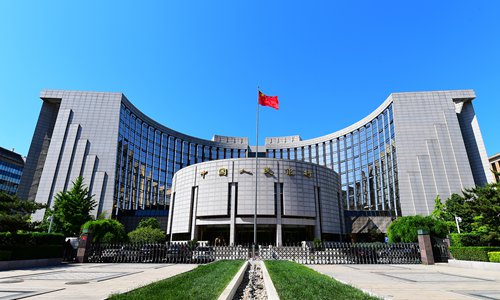
A view of People's Bank of China in Beijing. File photo: VCG
Growth in China's broad M2 money supply moderated in April, official data showed on Wednesday, as the economy's strong post-virus rebound remained intact.
The M2 money supply grew 8.1 percent year-on-year in April, easing from a gain of 9.4 percent in March and down 3 percentage points from the reading for last April, according to figures from the People's Bank of China (PBC), the country's central bank.
New yuan-denominated loans totaled 1.47 trillion yuan ($228.23 billion) in April, a decline of 229.3 billion yuan from 2020, PBC data showed. The number still suggested a rise of 452.5 billion yuan from the same period in 2019.
Total social financing fell by 1.25 trillion yuan year-on-year to 1.85 trillion yuan last month. The April reading was still up 179.7 billion yuan from its corresponding figure in 2019.
The credit figures came on the back of the economy's sustained recovery.
Manufacturing activity expanded at the quickest pace in four months this year, despite concerns over rising raw materials and input costs, per the Caixin/Markit Manufacturing Purchasing Managers' Index (PMI) for last month.
The PMI, weighted toward smaller private firms, jumped to 51.9 in April from 50.6 in March. A reading above 50 signals expansion, while a reading below the mark indicates contraction.
The Chinese economy recorded an 18.3 percent expansion in the first quarter, the fastest in three decades, with key economic indicators all rising at over 20 percent, according to the National Bureau of Statistics.
In its quarterly monetary policy report released on Tuesday, the central bank pledged to maintain macro policy continuity, stability and sustainability, continue to provide necessary support for the economy, and stabilize expectations.
The central bank also vowed to keep economic operations in a reasonable range and push the economy toward higher-level rebalancing over the course of rebooting.
Global Times


